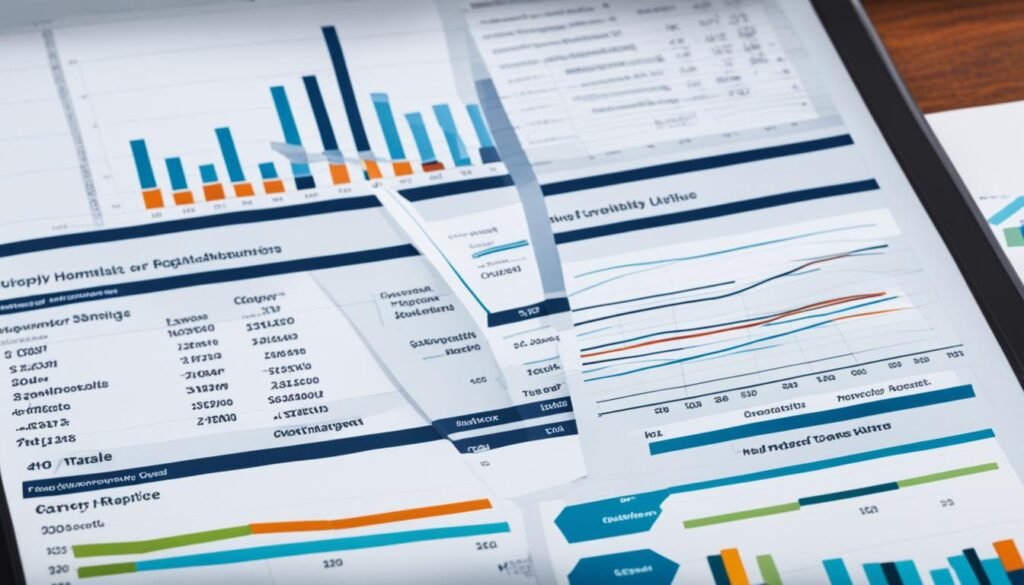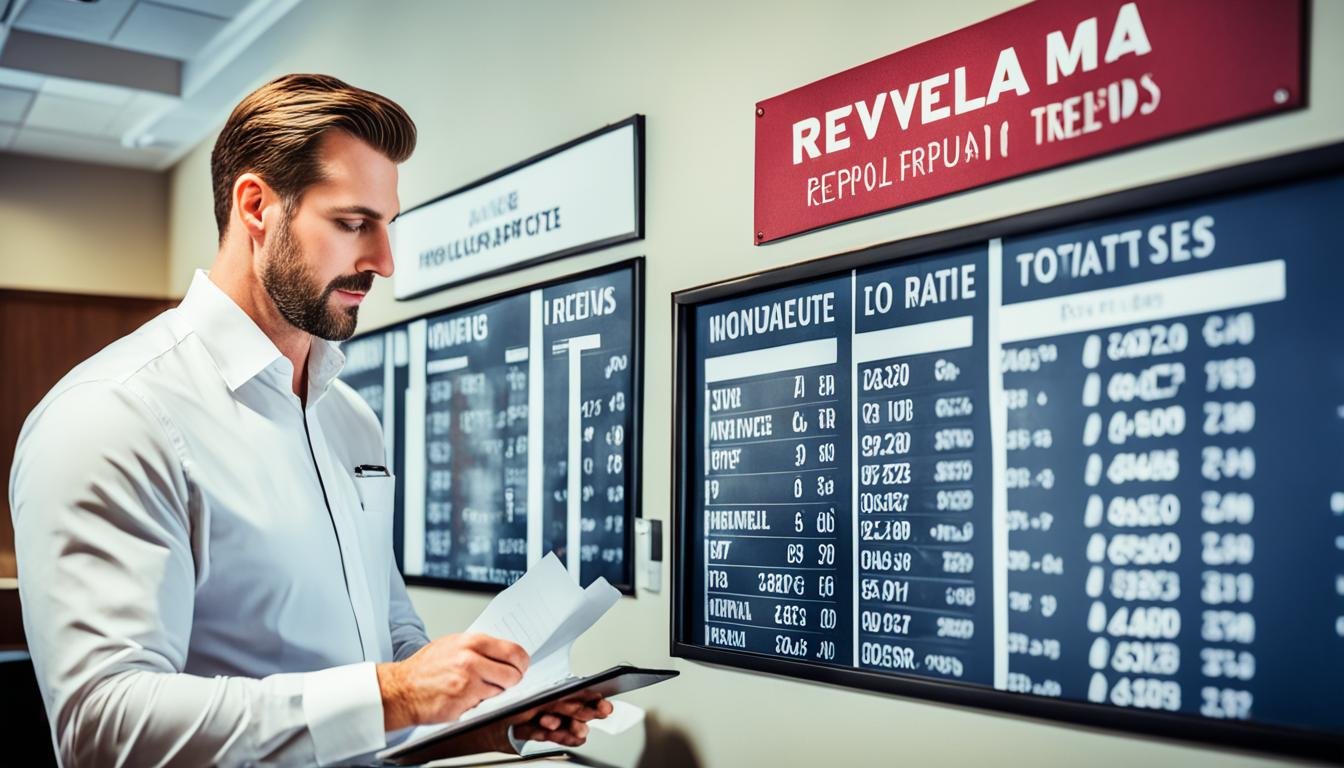Maximizing Profits with Revenue Management in Hospitality
In the competitive hospitality world, making the most money is crucial. Companies in the hotel business work hard to price things right, bring in more guests, and make more money. One very effective way to do this is through revenue management.
Imagine you’re planning a fun trip and looking for a hotel in a well-loved tourist spot. As you check out different travel sites, you see the hotel room prices change a lot from day to day. This makes you curious, so you look into it more. You find out the hotel is smartly changing its prices to match demand and what’s happening in the market. This gets you thinking about how these pricing tricks can help a hotel earn more and do better financially.
That’s exactly what we’re digging into here. We’ll show you why revenue management is a big deal in the hotel world. And we’ll look at the specific strategies that make more money for hotels. These include changing prices often, focusing on certain types of customers, using inventory wisely, and choosing the best ways to sell rooms. We’re covering all the important stuff.
Key Takeaways:
- Managing revenue is key for a hotel to make as much money as possible.
- By setting prices that change with demand, hotels can earn more.
- Picking certain customer groups to focus on helps increase revenue.
- Using what they have wisely, hotels can make sure they earn the most they can.
- Finding the best ways to sell rooms helps hotels connect with more people and get more direct bookings.
The Importance of Revenue Management in the Hotel Industry
Revenue management is key in the hotel industry due to limited rooms. Hotels can only rent out a room once a night. So, it’s crucial for them to set the right price. This way, they make the most money possible.
Hotels use strategies to manage their income wisely. These plans help them understand demand, set the right prices, and boost their money-making potential. By doing this, hotels improve their earnings, occupancy, and how they deal with their room availability.
Managing revenue well includes looking at future earnings, how to best use rooms, and marketing for more sales. By predicting when people will need rooms, hotels can decide on prices and where to sell rooms to make the most money. They also use tactics to offer the best rooms to the best customers at the best times. This helps them earn more when many people want to book.
Adding to this, revenue strategies also involve changing prices based on the market, aiming your marketing at certain groups, and picking the right places to sell rooms. Adjusting prices according to market changes and what the competition is doing brings in more money. Focusing on particular groups helps hotels appeal to those willing to pay extra for what they want.
Getting revenue management right is important, no matter the size of the hotel. It lets hotel owners use facts to make smart choices and boost their profits. By using the latest ways to handle revenue and smart earning plans, hotels grow stronger. This means better business, more money, and happier customers.
Image:
Building a Revenue Management Strategy for Hotels
To make more money, hotels need a solid revenue management plan. They should look at the competition, past results, and the prices of their offers. By doing this, they can set prices that boost their earnings and stand out in the market.
Competition Analysis
To set smart prices, hotels must know what their rivals are doing. This means studying how other hotels price their rooms, where they position themselves, and how much of the market they own. By doing this, hotels can offer prices that match what’s happening in the marketplace, staying competitive.
Historical Result Analysis
Looking at past data is key to understanding what works and what doesn’t. By studying how demand, how full the hotel is, and prices relate, hotels can spot trends. This helps them adjust their prices based on the time of year, events, and other market changes.
Package Evaluation
Packages are a big deal in the hotel world. But it’s important to check how well they are doing financially. Knowing which packages earn the most money and bring in the right customers is crucial. With this information, hotels can tweak their offers to earn more.
Demand Calendar
A demand calendar shows when people want to stay. It helps hotels see when prices can go up or down. By understanding these patterns, hotels can charge more when it’s busy and offer discounts when it’s not.
Pricing Structure
The way a hotel decides its room prices is its pricing structure. They look at things like the time of year, whether it’s a weekday or weekend, big events, and rival prices. A good pricing setup helps hotels make more money and balance how many rooms they sell.
| Revenue Strategy | Advantages | Disadvantages |
|---|---|---|
| Competitive Pricing | Attracts price-sensitive customers | May lead to lower profit margins |
| Value-based Pricing | Allows for higher profit margins | May attract a more price-sensitive customer base |
| Dynamic Pricing | Optimizes revenue based on real-time demand | Requires sophisticated pricing management systems |
| Premium Pricing | Targets high-end customers and luxury segment | May result in lower occupancy rates |
Dynamic Pricing for Revenue Optimization
Hotels use dynamic pricing to make more money. They change their room rates based on what people want, the market, and more. This strategy helps them make the most money they can. They set prices that draw in customers while also making a lot of profit.
This method uses data to set prices. Hotels look at past data, what their competition is doing, and the market’s current state. This way, they can find the sweet spot for their room prices. They get more money when people want rooms a lot. Plus, they lower prices when demand is slow, filling up more rooms.
For dynamic pricing to work, hotels must always be checking the market. They adjust prices to match or beat their competition. Being flexible like this lets hotels react to changes fast. It helps them make as much money as they can, no matter what the market looks like.
“Dynamic pricing is a powerful tool for revenue optimization in the hospitality industry. By leveraging real-time data and market insights, hotels can set prices that maximize revenue and drive profitability.”
Dynamic pricing helps hotels cater to different groups of customers. They look at what guests like and how they shop around. Then, they can offer sales just to those groups. This makes it more likely that special group will choose to stay, which brings in more money.
It’s also possible to use systems that change prices automatically. This helps hotels keep their prices right no matter where they’re being sold. With this tech helping out, hotels can focus on other important things. They can make sure they’re always making money in the smartest ways possible.
Benefits of Dynamic Pricing:
- Optimize revenue by setting prices based on real-time demand and market conditions.
- Maximize occupancy by adjusting prices during periods of low demand to stimulate bookings.
- Respond quickly to competitor rates and market trends to maintain competitiveness.
- Personalize pricing strategies to target specific customer segments and increase conversion rates.
- Streamline revenue management processes with the use of automation and technology.
| Dynamic Pricing Strategies | Benefits |
|---|---|
| Real-time Demand-based Pricing | Maximizes revenue by adjusting prices in response to fluctuating demand. |
| Competitor-based Pricing | Ensures competitiveness in the market by aligning prices with competitor rates. |
| Segment-specific Pricing | Targets specific customer segments with personalized pricing adjustments. |
| Seasonal Pricing | Optimizes revenue by adjusting prices based on seasonal demand patterns. |
Dynamic pricing is key for making a lot of money in the hotel business. By keeping up with what people want and how the market changes, hotels earn more. This insight helps them be as profitable as possible.
Segmenting and Targeting for Revenue Maximization
Segmenting the customer base helps hotels make more money. It does this by finding the most valuable groups. Then, they adjust their ads and prices to draw them in. This way, they can earn more from each visitor.
Segmenting means splitting customers into different groups. You do this based on things like who they are, how they act, or what they like. It lets hotels see what each group really wants. Then, they can offer just the right things to them.
Diving deeper, once they know their groups, hotels can target specific ones. They aim for the most valuable people. This means their money and ads go where they work best.
Knowing what each group likes helps hotels earn more. They change their ads and prices to fit each group’s desires. For instance, they might offer deals to business travelers and fun packages to families. This makes more people want to stay at the hotel.
Targeting also means guests get experiences they really love. Hotels learn what each group prefers. Then, they customize their services. This makes guests want to come back, bringing more money.
“Segmenting and targeting the market is essential for revenue maximization. By identifying high-value segments and tailoring marketing efforts and pricing strategies accordingly, hotels can attract the right guests and optimize revenue generation.”
Yield Management for Efficient Revenue Allocation
Yield management is key for hotels to make more money. It focuses on giving the right rooms to the right guests at the exact time. By doing this, hotels can earn more and be more profitable. They use smart strategies to guess what customers will want and make sure their rooms are used well.
Forecasting Demand Patterns
Hotels need to look at past trends and use special tools to guess what customers will need. This lets them plan ahead. So, they can decide on prices and how many rooms to offer the best way.
Strategic Inventory Allocation
Once hotels know what customers might need, they can offer rooms in smart ways to make more money. This means they might have special rules for when rooms can be booked or what kinds of rooms there are.
For example, during busy times, hotels might say you have to stay a certain number of nights. This helps them fill up more rooms and make more money. They also work out which rooms or extras different guests might like, making everyone happy and making more money.
“Yield management is all about allocating the right resources to the right customers at the right time. It ensures that we make the most out of our available inventory and generate optimal revenue.” – Hotel Revenue Manager
Booking Channel Optimization
Yield management also means picking the best ways for people to book. By keeping an eye on what works best, hotels can make more money. They might change how they set prices, promote booking directly, or work more with certain online places.
Benefits of Yield Management
Using these smart strategies can help hotels in many ways:
- They can make the most money by using rooms and prices well.
- They can get more guests and have more full rooms, making everything more profitable.
- They don’t have too many or too few rooms, so they use everything they have well.
- They make guests happy by offering just what they want, making them come back.
Using yield management is a must for hotels that want to do well in the hotel business.
| Benefits of Yield Management | Description |
|---|---|
| Maximized Revenue | Optimizing room allocation and pricing to maximize revenue potential. |
| Improved Occupancy Rates | Achieving high occupancy rates by ensuring optimal pricing and room allocation. |
| Enhanced Inventory Management | Strategically managing room inventory to prevent overbooking or underutilization. |
| Increased Customer Satisfaction | Offering personalized experiences and attractive pricing strategies to enhance customer satisfaction and loyalty. |
Distribution Channel Optimization for Revenue Maximization
It’s key for hotels to manage distribution channels well to make the most revenue. In our digital era, hotels can use many channels like OTAs, GDS, and direct bookings. By checking and improving how they use these channels, hotels can make more money, spend less on commissions, and boost their earnings.
Prioritizing direct bookings is a smart move. It lets hotels keep more of their earnings by skipping the middleman and avoiding high OTA fees. They can do this by making their booking sites easy to use, giving special deals for booking direct, and using social media and emails to get more visitors to their sites.
Less dependency on expensive channels and getting more direct bookings means hotels keep more money. They can also control their prices and how they manage their rooms better. This makes it easier to adjust their prices based on demand, which means they can make more money and be more profitable.
However, direct bookings don’t mean hotels should forget about OTAs and GDS completely. These platforms can help reach lots of potential guests. Hotels need to look at how well each OTA or GDS does, the fees they charge, the number of bookings they bring in, and the type of guests they attract. By choosing their OTAs and GDS partners wisely, hotels can attract more guests and make more money.
Using the latest technology is another important part of using distribution channels well. Things like property management systems and channel management software can make hotel operations smoother, help manage channels better, and let hotels change their prices and room availability quickly. This means they can avoid mistakes like booking too many rooms or not enough.
Take the example of Hotel XYZ. By focusing on getting more direct bookings, working better with OTAs, and using the latest tech, Hotel XYZ cut its OTA use and upped its direct bookings by 30% in six months. This brought down costs and grew their earnings and profit.
In short, managing distribution channels well is vital for hotel revenue. By choosing the right mix of channels and using the best practices, hotels can get more direct bookings, lower their costs, and make more money. Using technology and smart revenue management are crucial for steady growth in earnings and competing in the hotel market.
| Benefits of Distribution Channel Optimization | Methods of Distribution Channel Optimization |
|---|---|
| 1. Increased revenue | 1. Prioritizing direct bookings |
| 2. Reduced commission costs | 2. Strategic OTA partnerships |
| 3. Better control over pricing and inventory | 3. Leveraging technology and automation |
| 4. Reach a wider audience | 4. Continuous performance evaluation |
Revenue Forecasting and Analytics for Data-driven Decisions

Accurate revenue forecasting and data analytics are key in managing hotel incomes well. They use past data, market trends, and advanced tools to make better choices. This helps hotels earn more and grow steadily.
Forecasting revenue is crucial. It lets hotels predict when more people will book and change prices to fit. They look at past bookings, market changes, and special events to decide on prices and what rooms to offer.
Data analytics are also key. They give hotels a peek into what customers like and what’s happening in the market. With this knowledge, they spot chances to make more money and choose smarter strategies.
“Data analytics enables hotels to identify potential gaps in revenue generation and take proactive measures to address them.”
Tracking performance with KPIs shows how well revenue strategies are working. Things like ADR, RevPAR, and occupancy rate reveal success and areas where hotels can do better.
Using a system that mixes revenue forecasting and data analytics boosts hotels’ ability to thrive. It helps them set better prices, manage rooms easier, and compete well in the hotel industry.
Benefits of Revenue Forecasting and Data Analytics in Revenue Management
1. Optimized pricing strategies: These tools help hotels set the perfect prices for their rooms. By looking at what customers want and market trends, they ensure rooms are priced well to bring in more cash and stay full.
2. Improved inventory management: They also help in making sure the right rooms are available at the right times. This stops rooms from being left empty or sold twice, making the most of what the hotel has to offer.
3. Enhanced marketing and targeting: Such analytics let hotels aim their marketing at the most valuable guests. This means they can offer just what guests want, making guests happier and adding to the hotel’s income.
4. Identifying revenue opportunities: Forecasting and analytics point out where the hotel might miss making money. Hotels can then make changes early, follow new trends, and find new ways to earn more.
5. Competitive advantage: These tools help hotels stay ahead in the market. Making decisions based on data puts them in a better position to earn more, delight guests, and stand out.
Sample Revenue Forecast Table:
| Month | Actual Revenue | Forecasted Revenue |
|---|---|---|
| January | $100,000 | $95,000 |
| February | $110,000 | $105,000 |
| March | $120,000 | $115,000 |
| April | $115,000 | $110,000 |
| May | $125,000 | $120,000 |
Keeping an eye on how well forecasts match actual income helps hotels improve. They adjust strategies using real data to do even better.
Forecasting revenue and using data wisely allows hotels to grow steadily. Harnessing data gives them an edge in the ever-changing world of hospitality.
Conclusion
Today, in the bustling world of hospitality, managing revenue is key to success. Hotels boost their profits by using smart strategies. These include flexible pricing, focusing on customer types, managing the best use of space, choosing the best sales channels, making future predictions, and offering extra services.
Hotels need to always update how they manage their earnings. This is because the market always keeps changing. They must look at how well they’re doing, understand their data, and adjust what they’re doing to keep making money. Thinking about the future is super important to stay successful.
Another important strategy is making guests want to come back. When hotels create personal touches for their guests, they’re likely to come back again and again. This boosts how much those guests might spend over time. It all adds up to more money for the hotel.
In the end, using smart financial plans helps hotels both make more money and keep their guests happy. It’s all about learning from the past and making better choices for the future.
FAQ
Q: What is revenue management in the hotel industry?
A: Revenue management in the hotel industry is all about smart pricing and sales. It uses data and research to set prices right. This helps to make more money while keeping customers happy.
Q: Why is revenue management important in the hotel industry?
A: In hotels, rooms are limited; they can only be sold once a night. So, it’s vital to make sure they’re priced well. Good revenue management boosts earnings, fills more rooms, and keeps customers satisfied. This gives hotels an edge over their rivals.
Q: What are the key components of a revenue management strategy for hotels?
A: A good revenue strategy needs to look at the competition and past sales. It must also factor in what customers want. Setting the right prices at the right times is key.
Q: How does dynamic pricing optimize revenue?
A: Dynamic pricing tweaks room rates based on demand and what competitors are doing. It uses real-time data to set the best prices. This approach can help hotels earn more when demand is high. They can also lower prices to fill rooms when demand is low.
Q: How can segmenting and targeting optimize revenue generation?
A: Focusing on different customer groups can boost earnings. High-value guests bring in the most income. By targeting and pricing services for them, hotels can make more money. Knowing what different customers want means hotels can offer deals and services that they’ll love.
Q: What is yield management, and how does it optimize revenue allocation?
A: Yield management is about selling the right rooms to the right customers at the right times. It uses data to predict what people want. By doing this, hotels can fill rooms at prices that earn them the most. They might set stays for a minimum number of nights or offer certain rooms first to guests willing to pay more.
Q: How does distribution channel optimization maximize hotel revenue?
A: Being smart about where and how rooms are sold is key to making more money. Hotels can work on getting direct bookings instead of through middlemen. This means they keep more of the sales and save on fees. By expanding their sales outlets, hotels can attract more customers and grow their business.
Q: How do revenue forecasting and analytics contribute to revenue management?
A: Guessing how much money they’ll make and using data to make choices is important for hotels. They look at past sales and market trends to see what’s coming. With these insights, they can adjust prices and offers to meet their goals. Keeping track of how well they’re doing helps them stay on top of their business.
Q: How can revenue management strategies maximize hotel profitability?
A: Good revenue strategies help hotels make more money. They focus on pricing right, attracting the best customers, and selling more than just rooms. Hotels can grow by concentrating on what works best and always learning from their sales data.







